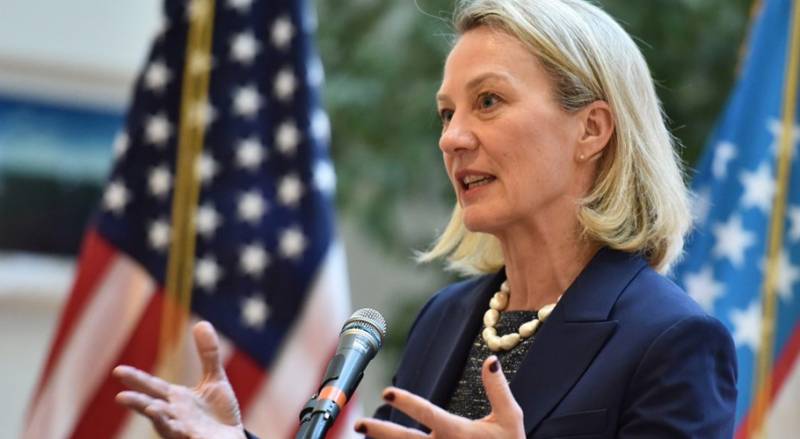Principal Deputy Assistant Secretary and Acting Assistant Secretary for South and Central Asia Ambassador Alice G. Wells Wednesday, while recounting Pakistan’s support for the Afghan peace process and actions against militant groups, said Islamabad’s commitment to peace in the region had grown.
Ambassador Alice Wells, who is about to retire on May 22 after a 31-year career, told an online press briefing that the US South Asian strategy had called for Pakistan’s decisive action against the militant groups, particularly those which had been supporting conflicts in Afghanistan.
Pakistan, she said, had taken constructive steps to encourage Taliban to advance the Afghan peace process, besides taking action against other groups such as arresting and prosecuting Lashkar-e-Taiba leader Hafiz Saeed and beginning to dismantle terror financing structures.
Alice Wells, a career diplomat who has served as acting assistant secretary of state for South and Central Asia for most of the Trump administration’s tenure, said during last three years, Pakistan’s relations with the United States had improved particularly in trade.
Alice Wells had assumed her duties as Acting Assistant Secretary for South and Central Asia on June 26, 2017. She previously served as the US Ambassador to Jordan; a senior adviser in the Near Eastern Affairs Bureau in the Department of State, as Special Assistant to the President for Russia and Central Asia in the White House (2012-2013); Executive Assistant to Secretary of State Clinton (2011-2012); and Executive Assistant to Under Secretary for Political Affairs William J. Burns (2009-2011).
Alice Wells said after assuming the office, President Trump had announced that the US needed to give a serious look to the Afghan policy in terms of its economic impact as well as the security risk to its security forces.
She said after over a year of talks, the US and Taliban signed a peace deal in which Taliban committed to bring down the violence in the country. The US was upholding its commitment and closely looking at the situation, she said and made it clear that the increased volume of violence in Afghanistan was unacceptable.
The ambassador, who would now be replaced by another veteran diplomat Tom Vajda, said the US welcomed the formation of an inclusive government in Afghanistan by President Ashraf Ghani and Abdullah Abdullah. The US was looking for rapid implementation of the mutual agreement and immediate steps to reach the much awaited intra-Afghan negotiations.
To a question, the ambassador said it was deeply in Pakistan’s interest to advance the Afghan peace process. As per their commitment, the US had seen solid cooperation from Pakistan’s civil and military leadership towards the Afghan peace talks.
She believed that the peace process would meet success during next five years. However, regarding the terror activities like the recent ones by the ISIS, the ambassador said both the Afghan government and Taliban should commonly fight such groups.
Commenting on the US support in the worldwide public health sector, she said the US had spent around 6$.5 billion dollar in assistance and donations. Since the outbreak of COVID-19, the US had provided $98 million to the South Asian and Central Asian countries to help them fight the pandemic.
The ambassador gave an overview of the US ties and cooperation with the South Asian and Central Asian states, including Pakistan, India, Nepal, Sri Lanka, Bangladesh, Bhutan, Uzbekistan, Tajikistan and others during the last three years, and reiterated that the US desired to establish mutually beneficial relations with all the states.






